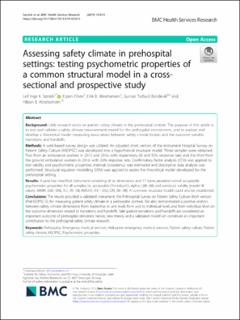| dc.contributor.author | Sørskår, Leif Inge Kjærvoll | |
| dc.contributor.author | Olsen, Espen | |
| dc.contributor.author | Abrahamsen, Eirik Bjorheim | |
| dc.contributor.author | Bondevik, Gunnar Tschudi | |
| dc.contributor.author | Abrahamsen, Håkon Bjorheim | |
| dc.date.accessioned | 2020-03-30T13:57:11Z | |
| dc.date.available | 2020-03-30T13:57:11Z | |
| dc.date.created | 2019-11-07T10:06:30Z | |
| dc.date.issued | 2019 | |
| dc.identifier.citation | BMC Health Services Research. 2019, 19 1-16. | |
| dc.identifier.issn | 1472-6963 | |
| dc.identifier.uri | https://hdl.handle.net/11250/2649473 | |
| dc.description.abstract | Background
Little research exists on patient safety climate in the prehospital context. The purpose of this article is to test and validate a safety climate measurement model for the prehospital environment, and to explore and develop a theoretical model measuring associations between safety climate factors and the outcome variable transitions and handoffs.
Methods
A web-based survey design was utilized. An adjusted short version of the instrument Hospital Survey on Patient Safety Culture (HSOPSC) was developed into a hypothetical structural model. Three samples were obtained. Two from air ambulance workers in 2012 and 2016, with respectively 83 and 55% response rate, and the third from the ground ambulance workers in 2016, with 26% response rate. Confirmatory factor analysis (CFA) was applied to test validity and psychometric properties. Internal consistency was estimated and descriptive data analysis was performed. Structural equation modelling (SEM) was applied to assess the theoretical model developed for the prehospital setting.
Results
A post-hoc modified instrument consisting of six dimensions and 17 items provided overall acceptable psychometric properties for all samples, i.e. acceptable Chronbach’s alphas (.68–.86) and construct validity (model fit values: SRMR; .026–.056, TLI; .95–.98, RMSEA; .031–.052, CFI; .96–.98). A common structural model could also be established.
Conclusions
The results provided a validated instrument, the Prehospital Survey on Patient Safety Culture short version (PreHSOPSC-S), for measuring patient safety climate in a prehospital context. We also demonstrated a positive relation between safety climate dimensions from leadership to unit level, from unit to individual level, and from individual level on the outcome dimension related to transitions and handoffs. Safe patient transitions and handoffs are considered an important outcome of prehospital deliveries; hence, new theory and a validated model will constitute an important contribution to the prehospital safety climate research. | |
| dc.language.iso | eng | |
| dc.rights | CC BY 4.0 | |
| dc.rights.uri | https://creativecommons.org/licenses/by/4.0/ | |
| dc.title | Assessing safety climate in prehospital settings: Testing psychometric properties of a common structural model in a cross-sectional and prospective study | |
| dc.type | Peer reviewed | |
| dc.type | Journal article | |
| cristin.ispublished | true | |
| cristin.qualitycode | 2 | |
| dc.identifier.doi | 10.1186/s12913-019-4459-5 | |
| dc.identifier.cristin | 1744817 | |
| dc.source.journal | BMC Health Services Research | |
| dc.source.volume | 19 | |
| dc.source.pagenumber | 1-16 | |

